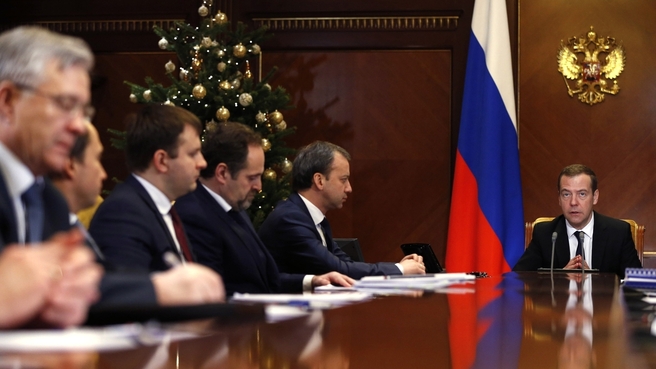Dmitry Medvedev: “The total annual investment of fuel and energy companies is estimated at 3.5 trillion roubles, and, of course, we are interested in having this money to work for the benefit of our economy. Due to import substitution, the share of imported products in fuel and energy company procurements will not exceed 10 to 15 percent once the strategy is implemented, that is, 20 years from now.”
Excerpts from Dmitry Medvedev’s opening remarks:
Today, we will discuss plans for the fuel and energy sector in the next 20 years, specifically, the measures the Government needs to take to upgrade Russia’s energy sector to make it more reliable and safe, to achieve the most efficient use of its energy resources, and to preserve leading positions in the global energy sector.
Our energy companies and foreign consumers should be given clear guidelines with regard to tax regulations and tariff and price policies in order to make our energy market more open, transparent, competitive and attractive to investors.
One of the challenges facing us is the dependence of our energy sector on foreign technology and equipment. Despite the decisions we have taken in recent years, this dependence remains at a critical level in a number of areas. This situation has to be changed. We should support our manufacturers who can make equipment and services that are competitive in terms of price and quality, and use tax and financial tools to encourage energy companies to use mostly Russian-made products and services.
The total annual investment of fuel and energy companies is estimated at 3.5 trillion roubles, and, of course, we are interested in having this money work for the benefit of our economy.
We will also support the localisation of manufacturing the most advanced equipment and technical solutions in Russia. We hope that due to import substitution, the share of imported products in fuel and energy company procurements will not exceed 10 to 15 percent once the strategy is implemented, that is, 20 years from now.
Today’s energy sector is a high-tech industry with stunning technological advances. It's not just about new ways of energy production and transportation, but also the emergence of the so-called New Energy based on renewable energy sources, distributed generating, and smart grids.
The energy intensity of our GDP is several times higher than in the developed and many developing economies. According to the Ministry of Energy, the energy saving potential is about a third of current energy consumption. Our strategy should envisage systematic steps to improve energy efficiency. This concerns not only the fuel and energy sector, but the entire economy as well, all the more so since our enterprises are already making energy-saving equipment.
Amid global changes in the world markets and growing competition, there’s a need for a well thought out and balanced export policy, which can provide for expanding areas and formats of cooperation in energy. We need to seriously diversify our energy exports both in terms of geography and product structure.
We will develop all areas of energy cooperation, including in Europe, the Eurasian Economic Union, Asia, including our contacts within the SCO, BRICS, and on a bilateral basis with any interested countries.












